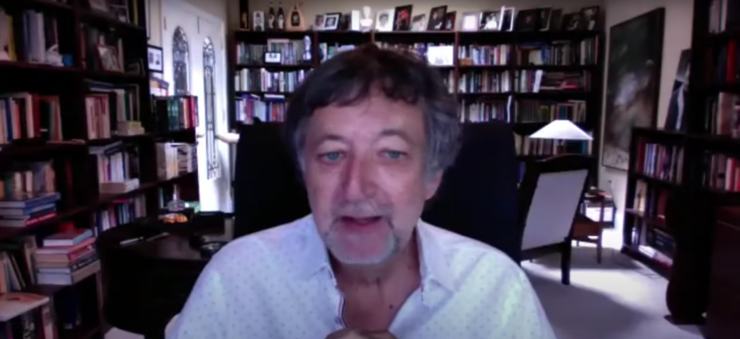Each year, Pembroke College in Oxford—the university where J.R.R. Tolkien taught Anglo-Saxon literature—holds an annual public lecture series in honor of the late author and professor.
Fantasy author Guy Gavriel Kay delivered this year’s lecture, titled “Just Enough Light: Some Thoughts on Fantasy and Literature.”
The Tolkien Lecture is designed to promote “the study of fantasy literature, and advances our understanding of it, by inviting influential and talented speakers to share their ideas on the field,” and was established in 2013 by the university’s students. Past speakers have included Kij Johnson, Adam Roberts, Lev Grossman, Terri Windling, Susan Cooper, V.E. Schwab, and Marlon James. (R.F. Kuang was supposed to give the lecture last year, but because of COVID, will do so at a to-be-determined date.) In 2020, the symposium brought back a bunch of prior speakers for a virtual panel discussion.
Kay is no stranger to Tolkien’s work: When Christopher Tolkien was working on compiling his father’s papers to assemble The Silmarillion, Kay was his assistant, and has credited that experience with helping his own career as a fantasy author.
He speaks a bit about his time in Oxford as a student, and then moves on to the meat of his discussion, citing a quote from British writer Walter Bagehot: “We must not let in daylight upon magic.”
“I’ll suggest that anyone in fantasy literature, the fantastic or fantastika — as John Clute frames it — needs to contend with the reverberations of Bagehot’s line. Among other things, I think it usefully serves as a possible demarkationer to solitude’s notion for radically different ideas: attitudes among writers, scholars, readers, towards the handling and the nuances of magic.”











“Pembroke College in Oxford—the university where J.R.R. Tolkien taught Anglo-Saxon literature” – That’s… so weirdly phrased it’s almost inaccurate. It implies either that Pembroke College is a university or that the City of Oxford is a university, neither of which is true.
Tolkien taught Anglo-Saxon Literature at Pembroke College, Oxford. Pembroke is the college, Oxford is the university (and the city). The college is *in* the city but is *part of* the university.
@Muswell, I wonder if it’s a US thing, if I understand correctly, there are colleges in the US that are independent and not part of larger universities, maybe that has something to do with the phrasin. (I’m Canadian myself, not 100% sure of the US system.)
@@@@@ thkThompson
You are correct. Generally speaking, an independent “college” in the US is an undergraduate-only institution, with no master’s or PhD programs; the presence of the latter is what makes for a “university”. (There are, of course, exceptions: Dartmouth College actually has graduate programs, including a medical school, and so is really a university in spite of its name.)
Also, it’s traditional in the US to refer to undergraduate education as “college” (“when I was in college”, “going to college”, etc.), regardless of whether the institution is a college or a university.
Hi,
I’m not going to get into a discussion about Oxford colleges. I’m going to tell you a story about my brother. If you Google my brother, Stratford Caldecott and Tolkein together, you’ll find that he’d written books about Tolkein. Anyway, when Strat died in 2014, there was a kerfuffle about where to bury him. The family wanted him to be buried locally in Oxford, where he’d studied and lived, but the graveyard was totally full. He was then offered a plot in Assisi, Italy. As his widow was discussing the logistics of shipping him there, etc, the undertaker suddenly said, “Last night a couple of trees were vandalised in the North Oxford Cemetery and need to be cut down. Go now and chat with the people who run the place, you never know, they might fit him in.” So my sister-in-law did. Not only was a double plot opened (which meant she could eventually be buried with him), but it was 4 plots back from Tolkein’s grave. So now my big brother is buried a little way behind his hero, and all my brother’s fans get a double whammy.